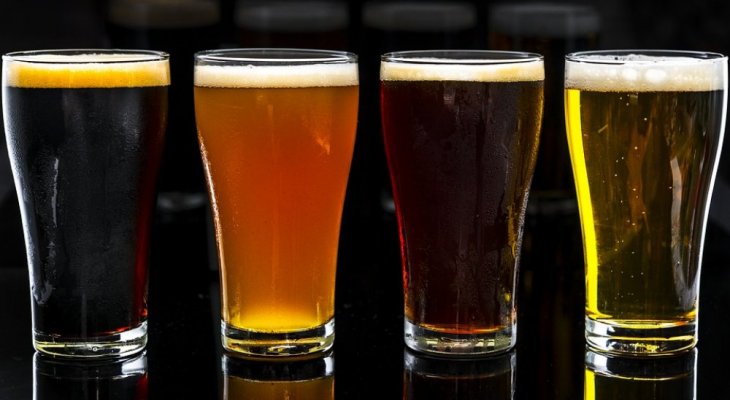How Long Does It Take To Brew A Lager? (Quick & Precise Answer)

In this Blog post I will answer the question of how long it takes to brew a lager. Lagers have some properties different from other beer types, and it is important to understand this to brew it correctly.
How Long Does It Take to Brew a Lager? A lager can take anywhere between 4 to 8 weeks or even longer to fully brew from start to finish. Lagers are famous for needing longer fermentation and bottle conditioning than other beers. It is important to age lager, since this is what gives the iconic flavor and crispiness which its famous for.
Continue reading this blog post to get a deeper understanding of how long it takes to brew a lager, and why it takes this long.
Read Also: What Is The Easiest Type Of Beer To Brew?
So, How Long Does It Take to Brew a Lager?
First of all, the word “lager” is a derivation of the German word “lagern” which means “to store”. Originally the lager style of beer brewing included long storage times in cold caves deep into the ground.
A typical ale can be enjoyed just 2-3 weeks after starting the brewing process, but lagers take multiple weeks or even months depending on the type.
The main reason for this is that lagers still use the old method of “cold” fermentation. When yeast gets cold it slows down and does its job of turning sugar into alcohol slower. This results in way longer fermentation times, and also affects the taste, aroma and overall body of the beer.
You can compare lagers a bit to wines in terms of how long it takes to make them. The actual brewing process takes anywhere from 1 to 3 weeks, depending on whether or not you use secondary fermentation.
The real kicker in terms of how long it takes before you can enjoy your lager, is the aging process.
Once you’ve bottled your lager it has to age for quite a while longer than most other beers. The overall rule of thumb for aging lagers is to age it a minimum of 4 weeks before its even consumable. However if you ask any homebrewing forum, they will probably tell you that this time is more in the lines of 6 weeks, but the longer you age it the better.
Aging your lager for longer periods of time will give you a better taste experience in general, and is definitely recommended if you have the patience.
How Long do You Ferment a Lager?
There really is no exact answer to how long you should ferment a lager, because you can’t really ferment it too long.
Lagers improve quite a lot with age, and not just in the bottle.
Lagers are fermented in a way colder environment than regular beers, which slows down the activity of the yeast quite substantially, resulting in longer fermentation times.
TIP: A good rule of thumb is that it is generally better to leave it “too long” than racking too early.
If you rack too early you will have a very sweet tasting beer, since the yeast hasn’t had enough time to properly consume it and turn it into alcohol.
You can leave your lager in the primary fermenter for anywhere between 2 to 6 weeks, but most homebrewers let it ferment for between 3 to 4 weeks.
You then have the choice of either bottling your beer or rack it to a secondary fermenter.
Myself and most homebrewers would suggest you use a secondary fermentation process for lagers especially.
The slow process of primary fermentation can leave quite a bit of sediment compared to other beer types, so racking your lager to a secondary fermenter and letting it sit for another week or 2, will give you a more clean and clear lager.
Are Lagers Harder to Brew?
Overall lagers are quite a bit harder to brew than most beers. Lagers require a very specific temperature control, and can be hard to achieve if you don’t have the necessary tools to make sure the temperature is just right.
I wrote a blog post on “What Every Home Brewer Needs” where you can find a description of a fermentation fridge/temperature controller amongst all other tools you should get for homebrewing.
Temperature is key in brewing lagers, from fermenting to storing, you gotta have the means to give lagers a cold environment to make sure they ferment and age properly.
Many lagers also require a whole new process during mashing, where some of the mash is taken out and heated and then returned to the mash, adding even more time to the brewing process.
This method is a huge pain in the butt and is why many homebrewers tend to stay away from lagers.
Even larger breweries are quite hesitant to brew lagers since they generally don’t make as much money as other beer types.
As a homebrewer I would suggest you do some heavy research before even attempting to brew lagers.
RECOMMENDATION: It may be a good idea to get comfortable with ales to start off with, especially if you are new to the homebrewing scene.
Be prepared to spend A LOT of extra time and money if you’re aiming to make lagers, and be ready for failure.
The hardest part of brewing lagers is to give it the time it needs. It can be quite hard to know when to move to the next step in the brewing process, so once again do some research and find out what has worked for others.
However, once you’ve mastered the brewing of lagers, you have some bragging rights, since it is a hard beer type to pull off, especially as a homebrewer.
Related Questions
What Are The Most Popular Lagers? The top ten brands for lagers in 2018 is as follows:
- Carling
- Foster’s
- Carlsberg
- Peroni Nastro Azzurro
- Stella Artois
- Coors Light
- Tennent’s
- San Miguel
- Kronenbourg
- Amstel
What is a Dry Lager? A dry lager refers to a lager which has been fully fermented for long periods of time, to the point where the fermentation simply can’t go on longer. This creates a beer that is almost entirely sugar-free and with a taste a bit more bitter than most other beers. Dry Lagers has a very crisp and refreshing mouth feel with a heavy hop and bitter taste.
Is Drinking Lager Good for You? Drinking beer in moderation has been proven to have health benefits. Drinking beer regularly in moderation can reduce your chance of heart diseases, alzheimers and migraines. It can also give you stronger bones and prevent type 2 diabetes. Remember to drink in moderation since overdrinking can lead to negative health implications and in the worst cases, death.
In My blog post “Is Homemade Beer Dangerous” I talk more about the possible dangers in homemade beer.
Read Also: Best Beer Recipe Kits



